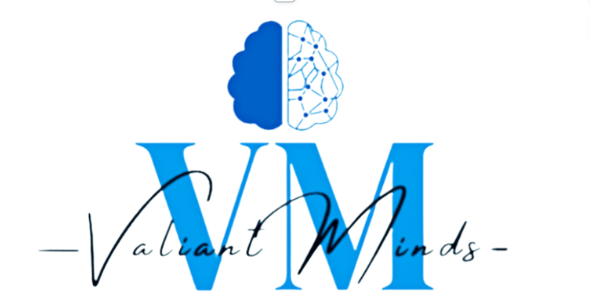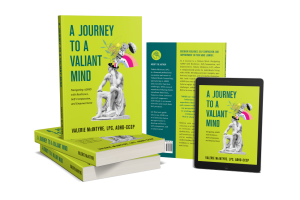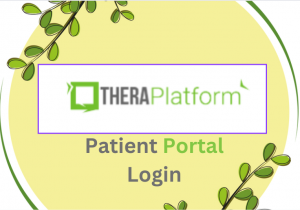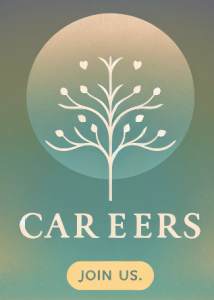
Valiant Minds Counseling recommends the following books for those looking to learn more about ADHD and related topics:
- “Driven to Distraction” by Edward M. Hallowell and John J. Ratey – This classic book provides an in-depth look at ADHD and its effects on adults, including strategies for managing symptoms and improving daily functioning.
- “The ADHD Workbook for Teens” by Lara Honos-Webb – This workbook is specifically designed for teens with ADHD and provides practical tips and strategies for managing symptoms and improving daily functioning.
- “Taking Control of ADHD” by Russell A. Barkley – This comprehensive guide provides an overview of ADHD and its effects on children, adolescents, and adults, as well as strategies for managing symptoms and improving daily functioning.
- “The Organized Mind” by Daniel J. Levitin – This book provides an overview of the cognitive and neurological processes that underlie ADHD and provides practical strategies for managing symptoms and improving daily functioning.
- “ADD-Friendly Ways to Organize Your Life” by Judith Kolberg and Kathleen Nadeau. This book provides practical strategies for managing the unique organizational challenges that women with ADHD often face.
- “The Queen of Distraction: How Women with ADHD Can Conquer Chaos, Find Focus, and Get More Done” by Terry Matlen. This book provides insight into the unique challenges that women with ADHD face, as well as practical strategies for managing symptoms and improving daily functioning.
- “Understanding Women with ADHD” by Sari Solden. This book provides a comprehensive look at the unique experiences of women with ADHD, including the impact on relationships, career, and self-esteem.
- “You Mean I’m Not Lazy, Stupid or Crazy?!: The Classic Self-Help Book for Adults with Attention Deficit Disorder” by Kate Kelly and Peggy Ramundo. This book provides a comprehensive overview of ADHD in adults, including the unique experiences of women with ADHD, and offers practical strategies for managing symptoms.
- “The ADDed Dimension: How to Maximize Your ADD Life” by Jeanette McCabe. This book provides a comprehensive overview of ADHD in adults, including the unique experiences of women with ADHD, and offers practical strategies for managing symptoms, including self-care, mindfulness and goal setting.
Here are a few self-help workbooks for ADHD that have received positive reviews:
- “The Adult ADHD Tool Kit: Using CBT to Facilitate Coping Inside and Out” by J. Russell Ramsay and Anthony L. Rostain: This workbook uses cognitive-behavioral therapy (CBT) techniques to help individuals with ADHD manage symptoms and improve daily functioning.
- “Taking Charge of Adult ADHD” by Russell A. Barkley: This workbook provides practical strategies and techniques for managing symptoms of ADHD in adults.
- “The ADHD Workbook for Teens: A Guide to Managing Symptoms and Succeeding in School and Life” by Lara Honos-Webb: This workbook is specifically tailored for teenagers with ADHD and provides strategies for managing symptoms and achieving success in school and other areas of life.
- “The Mindfulness Workbook for ADHD: A Guide to Cultivating Focus, Presence, and Peace” by Mark Bertin: This workbook uses mindfulness techniques to help individuals with ADHD improve focus, reduce impulsivity, and manage symptoms.
- “ADHD: A Complete and Authoritative Guide” by Dr. Russell A. Barkley, Kevin R. Murphy, Mariellen Fischer: This book provides a comprehensive overview of ADHD, including information on symptoms, causes, and treatment options. It also includes practical strategies and tips for managing symptoms and improving daily functioning.
It’s important to consult with a qualified healthcare professional before starting any self-help program. At Valiant Minds Counseling, we will be able to give you personalized advice and treatment.
The following websites for those looking to learn more about ADHD and related topics:
- “CHADD” (Children and Adults with Attention-Deficit/Hyperactivity Disorder) – This website provides a wide range of information on ADHD, including the latest research and treatment options.
- “ADDA” (Attention Deficit Disorder Association) – This website is specifically designed for adults with ADHD and provides a wide range of resources and support.
- “ADDitude” – This website provides a wide range of information on ADHD, including the latest research, treatment options, and strategies for managing symptoms in both children and adults.
- “ADD.org” – This website is an online community for people with ADHD, with a wide range of resources and support, including forums, articles and videos.
- “Help4ADHD” – This website is a resource center for families and individuals affected by ADHD, providing information, resources, and support for managing symptoms and improving daily functioning.
- “NIMH” (National Institute of Mental Health) – This website provides up-to-date information on a variety of mental health topics, including ADHD.
- “CDC” (Center for Disease Control and Prevention) – This website provides information and resources on ADHD, including factsheet, statistics, and recommended interventions.
These websites provide valuable information, resources and support for people with ADHD, as well as their families, friends and carers. However, it is important to remember that websites are not a substitute for professional counseling or medical advice. If you are experiencing difficulty managing your symptoms, it is important to speak with a mental health professional. At Valiant Minds Counseling, we will be more than happy to help you!
Valiant Minds Counseling recommends the following apps for managing ADHD symptoms:
- “Todoist” – This app helps users stay organized by allowing them to create to-do lists, set reminders, and track progress on tasks.
- “Evernote” – This app allows users to take notes, create to-do lists, and organize information in a variety of ways, making it a useful tool for staying on top of tasks and information.
- “Forest” – This app uses gamification to help users stay focused by allowing them to “plant” a virtual tree and watch it grow as they stay on task.
- “Pomodoro Timer” – This app uses the Pomodoro Technique to help users break tasks down into manageable chunks of time and stay focused on the task at hand.
- “Calm” – This app offers a variety of tools to help users relax and reduce stress, including guided meditations, mindfulness exercises, and calming sounds.
- “Headspace” – This app offers guided meditation and mindfulness exercises which can help to improve focus and reduce stress.
- “Habitica” – This app gamifies habit-forming and goal setting, allowing users to track progress, earn rewards, and compete with friends.
- “MindNode” – This app allows users to create visual mind maps, which can be helpful for organizing thoughts and information.
It is important to note that apps are not a substitute for professional counseling or medical advice. If you are experiencing difficulty managing your symptoms, it is important to speak with a mental health professional. Additionally, it is always good to try and experiment with different apps to find what works best for you.






